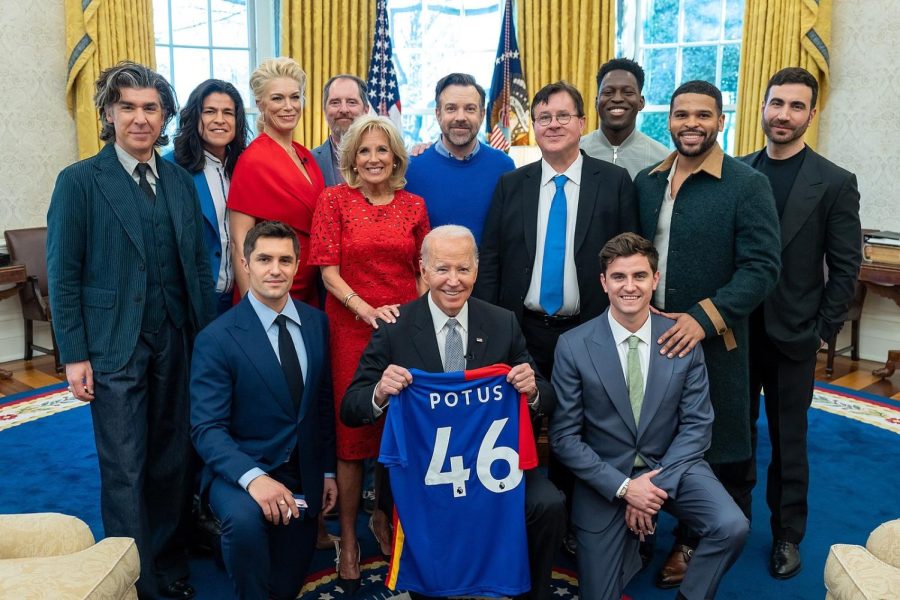‘Ted Lasso’ cast visits White House, highlights importance of mental health
As part of the Biden administration’s policy on improving national mental health, some famous figures and groups have been invited to speak at the White House, including the cast of Apple TV’s “Ted Lasso.”
On March 20, the main cast of the Apple TV+ show “Ted Lasso” visited the White House, with leading man Jason Sudeikis promoting the importance of mental health and ensuring your friends and loved ones are doing OK. Joined by his co-stars Brett Goldstein, Hannah Waddingham, Brendan Hunt and others, Sudeikis met with President Joe Biden and first lady Jill Biden, then spoke about why one’s mental health is connected to a person’s whole being.
“While [getting help is] easier said than done, we also have to know that we shouldn’t be afraid to ask for help ourselves,” Sudeikis said.
“Ted Lasso” was first released on AppleTV+ in 2020 and now is in its third season. From the beginning, the show emphasized the importance and gravity of mental health and proper wellness. Even in its first season, the message of how necessary it is to take care of one’s mind was never hidden.
In the second season, dealing with serious trauma leads the Ted Lasso character to take a big step: talking with a professional therapist after she notices the cracks underneath his good-natured demeanor. The character’s process of getting help is not depicted as easy, and doesn’t immediately resolve his great burden, but still is an important action for anyone to take and deserves recognition.
Throughout the show, the character is selfless and kind. He ensures that those around him are OK both mentally and emotionally and becomes the backbone of his motley crew of English football players and management. Supporting his friends with gifts and advice, Lasso feels like he doesn’t need the same kind of help, but by the middle of the second season, he realizes that he does indeed have a massive issue that needs to be addressed. He realizes refusing its existence was not only a bad choice, but actively detrimental to his life and work.
Even while mental and psychological services have become more accessible, there is still a stigma against getting help, as described by the American Psychiatric Society. The cast and crew of “Ted Lasso” are attempting to make it more acceptable for people to get the help they need.
In many places and among many communities, getting mental help or aid is seen as a weakness. According to a survey conducted by the Women’s College Hospital in Toronto, Canada, in which more than 1,500 Canadian adults participated, more than 40 percent of the participants have experienced signs of depression or anxiety, but have not sought medical help, and 42 percent of participants stated they would be embarrassed to admit that they have mental health issues.
According to Tony VanWinkle, an assistant professor in Guilford’s cultural anthropology and sociology department, in our society, mental health issues often are seen as “our own failures” rather than problems stemming from circumstances in the world around us. “By acknowledging mental health issues and trauma, it is de-mystifying and destigmatizing getting mental help,” he said.
Guilford senior Andy Li also shared insights into the mental health crisis, saying, “It is very difficult for workers and normal people to get mental health (assistance), as doctors and the industry charge a lot. Schools have people you can talk with, but outside of (these people), it is harder to get easy access to mental health professionals.”
While VanWinkle and Li said they are not familiar with “Ted Lasso,” they both recognize and emphasize that when such a popular show makes a direct statement about the importance of mental health, it can make a big impact on viewers.










